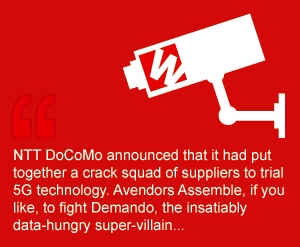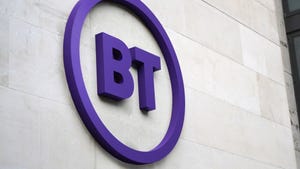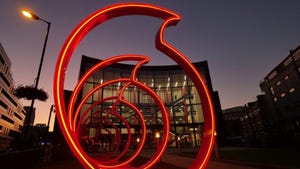Poor old Mobistar. The Belgian operator was probably bristling with pride this week after becoming the first in its market to complete a test of LTE Advanced technology. In partnership with Huawei it aggregated 1800MHz and 800MHz spectrum to drive throughput of more than 200Mbps. The firm’s chief network officer heralded “the future of high-speed mobile” upon the trial’s completion.
May 9, 2014

By The Informer
Poor old Mobistar. The Belgian operator was probably bristling with pride this week after becoming the first in its market to complete a test of LTE Advanced technology. In partnership with Huawei it aggregated 1800MHz and 800MHz spectrum to drive throughput of more than 200Mbps. The firm’s chief network officer heralded “the future of high-speed mobile” upon the trial’s completion.
But the future is just the past waiting to happen and Japan’s NTTDoCoMo was on hand to trump its Belgian peer, announcing that it had put together a crack squad of suppliers to trial 5G technology. Avendors Assemble, if you like. Doc Omo’s superhero roster comprised Alcatel–LucentMan, CaptainEricsson, TheIncredibleFujitsu, DarkNEC, SuperNokia, SamsungGirl and TheInvisibleHuawei (invisible in the sense that it was entirely absent from the list).
That’s a film you wouldn’t want to go and see, isn’t it. The secret weapons and skills employed by this band of shadowy heroes to fight Demando, the insatiably data-hungry super-villain, include The Millimeter Wave, The Time-Domain Beamforming, The Enhanced MIMO and Fujitsu-Jujitsu. Doc Omo plans to deploy his 5G defences in 2020, by which time slobbering Demando will have reached terrifying proportions.
More than that we do not yet know. The Informer called up NEC to ask for an interview for a 5G feature he’s writing and was told that the firm has yet to decide whether or not it can talk about it. The first rule of 5G Club… etc. It might not be in vendors’ interests to talk about it, anyway. As one ALU exec pointed out with admirable candour at MWC this year, talking about 5G makes it harder to sell 4G.
A different NEC featured in some LTE Broadcast trials over the weekend. This NEC is a Dutch football team and, during its match against Ajax on Saturday, KPN, Ericsson, Qualcomm, IBM and Samsung carried out the country’s first trial of the video distribution technology.
Meanwhile Ericsson was also the supplier behind Algeria’s first LTE network, which was recently sent live by incumbent operator AlgérieTélécom. Ericsson said that the Algerian incumbent’s copper and fibre network has come under “extreme strain” thanks to “massive demand” for high speed internet access in Africa’s largest country.
The LTE network will initially be deployed in areas beyond the reach of the operator’s fixed network, before being extended to high usage hotspots, including airports, universities and business districts.
LTE accounts for only a fraction of African mobile deployments. Figures from Informa’sWCISPlus show that it had been launched in only ten African markets by the end of the first quarter this year and had amassed 1.67 million subscriptions across those markets. South Africa accounts for the vast majority—1.31 million—of those subscriptions.
Staying in the region, Emirates-based Etisalat has signed an agreement to sell its holdings in Benin, the Central African Republic, Gabon, the Ivory Coast, Niger and Togo to MarocTelecom for $650m. The units all operate under the Moov brand but the agreement also covers Ivory Coast-based IT services provider PrestigeTelecom.
The deal forms part of Etisalat’s acquisition of Vivendi’s 53 per cent stake in Maroc Telecom. Last week Etisalat, which is the most valuable public company in the UAE, announced that it had secured the €3.15bn funding to buy the French firm’s holding in Maroc Telecom by having a look down the back of the sofa. No it didn’t, it said the funds were raised with a group of 17 international, regional and local banks in the United Arab Emirates.
The move will give Etisalat control over Maroc Telecom and will put an end to a lengthy battle for the operator that has seen several operators vying for control of the company including Ooredoo, FranceTelecom, Qatari operator Qtel and South Korea’s KTCorp.
Maroc Telecom, a publicly listed company on both the Casablanca and Euronext Paris Stock Exchanges, is Morocco’s market leading operator with 18.2 million subscribers in Morocco at the end of December, according to Informa’s WCIS Plus. It also has operations in four West African countries.
A little to the North, Spanish media group Prisa has accepted incumbent operator Telefónica’s €725m bid for its 56 per cent stake in pay TV platform Canal+’s holding company DistribuidoradeTelevisiónDigital (DTS). If approved by regulators, will give Telefónica a controlling stake of 78 per cent, leaving Italy’s Mediaset with a 22 per cent holding. Telefónica and Mediaset-owned Telecinco acquired their stakes from Prisa in 2010.
Prisa has committed itself to completing the negotiation of contracts with Telefónica within 30 days. The acquisition of Canal+, formerly known as Digital+, will establish Telefónica as the major pay TV operator in Spain, combining the satellite platform with its Movistar Fusión TV service, combining the Canal+ base of 1.6 million homes with the Fusión TV base of 670,000.
Telefónica recently acquired rights to the Euro 2016 and World Cup football qualifiers in Spain, while Canal+ holds rights to national La Liga games of major clubs.
Spanish competition regulator the CNMC has previously indicated that the acquisition of Canal+ by Telefónica should be examined by the European Commission and that it could have important consequences for competition in the Spanish pay TV market.
OrangeSpain has already urged the CNMC to either veto the deal or impose significant remedies before it is passed. Meanwhile Vodafone’s €7.2bn acquisition of Spanish cable player Ono, which offers high speed broadband and pay-TV services, is ongoing.
In Germany, where Telefónica and Vodafone are both involved in other M&A activity, incumbent DeutscheTelekom launched a mobile wallet this week, and voiced plans to extend the offering to further markets; to Slovakia in mid-May and in Hungary later this year.
The MyWallet service stores customer data on an NFC-enabled SIM card. It also uses the MyWallet app, which is available to download for free from Google’s Play Store. According to Deutsche Telekom, there are already 35,000 merchants in Germany and more than 1.6 million merchants worldwide that will support the MyWallet card payments.
At launch the wallet is compatible with 18 Sony and Samsung Android smartphone models. According to the operator, this is equivalent to over two million Deutsche Telekom subscribers in Germany.
Subscribers without compatible handsets can use an NFC attached to the back of their devices in order to use their smartphone as a MyWallet card.
The operator has identified former German capital Bonn as its flagship city to showcase the technology. It said that there are nearly 1,000 terminals at shops and restaurants on the city and the operator plans to run promotions in Bonn for subscribers in the coming months.
The firm has a few bob to put in its own wallet, having more than tripled its net profit for the first quarter compared to 2013. The firm pulled in €1.8bn, helped by the partial sale of the Scout24 online marketplace group. Take that nice little earner out of the equation and you get a rather more bleak 23.5 per cent decrease in profit.
Things are going no better next door in Austria, where the market’s incumbent TelekomAustria has reported a year on year decline of� 26.5 per cent in net profit for the first quarter of 2014. Group revenues for the firm, which has operations in a number of Central and Eastern European markets, were down seven per cent to €975.9m, yielding profit of €40.8m.
In what has become a familiar refrain, Telekom Austria blamed intense competition, regulatory intervention in Europe and economic challenges in Central and Eastern Europe for the decline in performance.
“We knew that the 2014 business year was going to be difficult,” said CEO Hannes Ametsreiter in a statement. “The numerous remedial measures, which we put in place in the first quarter 2014 to improve our earnings power, will bear fruit in the further course of the year. Nevertheless, we are already seeing the first signs of improvement in our markets and the increase in EBITDA margin demonstrates that we are on the right track with our strategy.”
In April this year Mexican operator AmericaMovil, which already holds a 26.81 per cent stake in the group, announced a bid to acquire all outstanding shares in the Austrian operator. If its bid is successful it has pledged to back a €1bn capital increase in the firm.
Also relating financial woes to the world this week was Taiwanese handset vendor HTC, which recorded a loss of around $60m for the quarter. Accordingly the firm dedicated its financial results press release to a glowing assessment of its flagship smartphone, the HTC One. “Volume of buzz and brand momentum both increased globally in March,” the firm said, adding an interesting new metric—VoB—to the accountancy canon.
Hindsight is a wonderful thing. If only HTC had hung onto its 50.1 per cent stake in Dr Dre’s headphone business Beats, it could now be about to reap a handsome profit. Reports emerged this week that Apple is close to buying Beats, which recently launched a music streaming service, for $3.2bn. HTC bought it’s controlling share in 2011 for $309m but offloaded it at an $80m profit in 2012. If the Apple deal does come to pass and HTC had held on to its stake… well, there’s no point dwelling on it, is there.
Putting a positive spin on the numbers this week was Norwegian incumbent Telenor, which has seen its Q1 revenue grow 7.2 per cent year on year to reach NOK26.5bn ($4.48bn). The group’s adjusted operating profit also grew 11.9 per cent year on year from NOK4.99bn in 1Q13 to NOK5.58bn in 1Q14.
The firm said that it added six million new subscribers during the quarter; the most that the group has managed in two years. It attributed its growth primarily to its operations in India, Pakistan and Bangladesh.
According to CEO and president Jon Fredrik Baksaas (whose name prompts the question: What’s baks, and how can you consume it as a service?), the operator is seeing rising demand for larger data packages, which resulted in improved mobile revenue growth of more than three per cent in the quarter. “Competitive pressure and declining revenues from traditional fixed telephony require us to focus on streamlining our operations and investments,” he added.
The importance of Pakistan was underscored with the news that Telenor has appointed a new CEO for the market. Michael Patrick Foley currently serves as chief commercial officer at the CanadianStateLottery and will assume his new role on in July this year.
He replaces Lars Christian Iuel, who will take up a senior management position at Telenor Group in Norway. Telenor set up in Pakistan in 2005 and has since built a customer base of 34.3 million subscribers as of March 2013, ranking it as the second largest operator in the country behind PMCL which has 37.1 million, according to Informa’s WCIS.
Finally this week, some men will tell you that diameter is the most important thing, and those men work at TeliaSonera International Carrier. The Nordic operator’s carrier services arm has launched what it claims is the first managed Diameter signalling service, enabling other mobile operators to offer LTE roaming services to their customers.
The Diameter Roaming Exchange (DRX) offering has already been deployed by the operator’s subsidiaries in Sweden, Norway, Spain, Finland and Denmark and will be rolled out to its Eurasian properties in the near future, the firm said.
It added that the DRX, which depends on the firm’s own global IPX network for international connectivity, carried “multiple gigabytes” of data for Swedish and Norwegian attendees at this year’s Mobile World Congress.
And that’s about the size of it this week.
Take care
The Informer.
Read more about:
DiscussionYou May Also Like






.png?width=300&auto=webp&quality=80&disable=upscale)


_1.jpg?width=300&auto=webp&quality=80&disable=upscale)


.png?width=800&auto=webp&quality=80&disable=upscale)